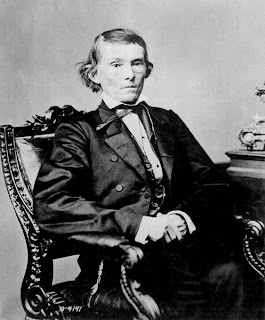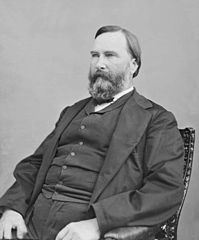I wanted to explore this topic for some times.
CS presidential election - November 1867
Background:
The 'Second Revolution' has been won with the armistice of 1865 (about a year after the election of McClellan).
The naval blockade has been lifted, even if the Union has decreed a trade embargo.
Western and northern Virginia, eastern Tennessee, Kentucky, Missouri, northern Arkansas, and several coastal strips in Carolinas and Florida remain under 'occupation'.
Kentucky and Missouri, despite being occupied, have still delegations in the Congress, which is not without triggering some electoral controversies.
There are no formal political parties; instead, several factions have appeared, mainly centered around state delegations and ambitious congressmen.
The capital is still Richmond.
Vice President A.H. Stephens (GA) / J. Longstreet (AL) ; 57 electoral votes (37.6 % of the popular vote)
Governor Z.B. Vance (NC) / Governor T.O. Moore (LA) ; 40 electoral votes (34.4 % of the popular vote)
J.C. Breckinridge (KY) / Governor P. Murrah (TX) ; 26 electoral votes (17.4 % of the popular vote)
P.G.T. Beauregard (LA)/ S.R. Mallory (FL) ; 8 electoral votes (9.8 % of the popular vote)
Minor candidates; 0 electoral votes (0.8 % of the popular vote)
None of the tickets receive a majority of the electoral vote (66).
# In the House of Representatives, the delegations of Florida and Louisiana join Vance while the delegations of Texas and Kentucky join Stephens; the delegation of Arkansas proves to be the key (32,8% to Stephens and 32,5% to Vance during the election) and finally pronounces for Stephens:
Vice President A.H. Stephens (GA) : 7 delegations
Governor Z.B. Vance (NC) : 6 delegations
# In the Senate, the Senators from Virginia, Tennessee, Georgia, Kentucky, Missouri and Texas vote for Stephens, while the Senators from North Carolina, South Carolina, Alabama, Mississippi, Florida and Louisiana vote for Vance. Arkansas become again the key state, but the election comes into a deadlock as both Longstreet and Moore get a senator from the state:
J. Longstreet (LA) : 13 Senators
Governor T.O. Moore (LA) : 13 Senators

CS presidential election - November 1867
Background:
The 'Second Revolution' has been won with the armistice of 1865 (about a year after the election of McClellan).
The naval blockade has been lifted, even if the Union has decreed a trade embargo.
Western and northern Virginia, eastern Tennessee, Kentucky, Missouri, northern Arkansas, and several coastal strips in Carolinas and Florida remain under 'occupation'.
Kentucky and Missouri, despite being occupied, have still delegations in the Congress, which is not without triggering some electoral controversies.
There are no formal political parties; instead, several factions have appeared, mainly centered around state delegations and ambitious congressmen.
The capital is still Richmond.
Vice President A.H. Stephens (GA) / J. Longstreet (AL) ; 57 electoral votes (37.6 % of the popular vote)
Governor Z.B. Vance (NC) / Governor T.O. Moore (LA) ; 40 electoral votes (34.4 % of the popular vote)
J.C. Breckinridge (KY) / Governor P. Murrah (TX) ; 26 electoral votes (17.4 % of the popular vote)
P.G.T. Beauregard (LA)/ S.R. Mallory (FL) ; 8 electoral votes (9.8 % of the popular vote)
Minor candidates; 0 electoral votes (0.8 % of the popular vote)
None of the tickets receive a majority of the electoral vote (66).
# In the House of Representatives, the delegations of Florida and Louisiana join Vance while the delegations of Texas and Kentucky join Stephens; the delegation of Arkansas proves to be the key (32,8% to Stephens and 32,5% to Vance during the election) and finally pronounces for Stephens:
Vice President A.H. Stephens (GA) : 7 delegations
Governor Z.B. Vance (NC) : 6 delegations
# In the Senate, the Senators from Virginia, Tennessee, Georgia, Kentucky, Missouri and Texas vote for Stephens, while the Senators from North Carolina, South Carolina, Alabama, Mississippi, Florida and Louisiana vote for Vance. Arkansas become again the key state, but the election comes into a deadlock as both Longstreet and Moore get a senator from the state:
J. Longstreet (LA) : 13 Senators
Governor T.O. Moore (LA) : 13 Senators
Stephens, as Vice President, gives his casting vote to his running mate.
Final Result:
Elected 2nd President of the CSA

Alexander Hamilton Stephens
from Georgia
Final Result:
Elected 2nd President of the CSA

Alexander Hamilton Stephens
from Georgia
Elected 2nd Vice President of the CSA

James Longstreet
from Alabama

James Longstreet
from Alabama
Last edited:

